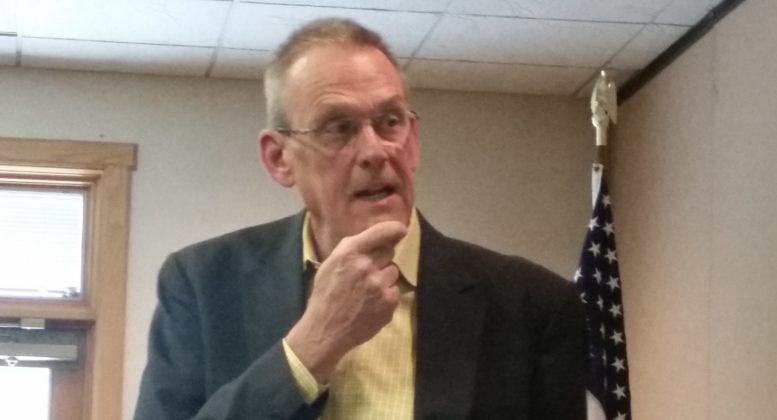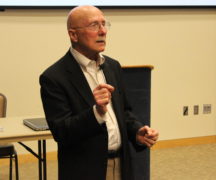By JAN LARSON McLAUGHLIN
BG Independent News
Advocates for climate change efforts already had a rough road ahead – and Donald Trump’s election has made the climb even steeper.
But David Holmquist, a regional leader for Citizens Climate Lobby in the Chicago area, is no stranger to fighting against difficult odds. Unlike other climate legislation advocates who work with already converted Democrats, Citizens Climate Lobby takes a different strategy.
This group tries to win over resistant Republicans.
“If we want to get climate change legislation, we have to have Republicans on board,” Holmquist said Thursday as he spoke with the Bowling Green Kiwanis Club. So instead of being argumentative with conservatives, the climate lobby tries to convert Republicans with respect and reason.
The group of volunteer lobbyists get a range of reactions from Republicans, from supportive to antagonistic. Holmquist was asked Thursday where U.S. Rep. Bob Latta, R-Bowling Green, stood on that scale. Holmquist said he was uncertain – but wouldn’t tell even if he knew. The Citizens Climate Lobby keeps its efforts with individual legislators confidential, he added.
“We have allies and we don’t want to out them” until they are ready, he said.
“Our mission is to create the political will for a stable climate,” Holmquist said. “That attitude has allowed us to make inroads with people who don’t agree with us.”
The climate lobby group, founded in 2007, has a volunteer force of nearly 40,000 members and supporters. They don’t consider themselves environmentalists, but rather realists. The organization was founded by Marshall Saunders, a businessman who realized that all he had created in Bangladesh would be swallowed by water if efforts weren’t made to counter climate change.
Saunders started out trying to persuade average citizens to support the cause. But he realized that was the wrong route when his speech to a group convinced a handful of people to change to energy efficient lightbulbs, on the same day that Congress granted major subsidies to the fossil fuel industry.
“He decided he needed to be talking with Congress,” Holmquist said.
And that means dealing with less than welcoming Republicans.
“There’s virtually no chance we’ll have a Democratic Congress until at least 2022,” he said.
But Holmquist said more and more Republicans are open to the idea of climate change legislation. “We do have some hostile meetings,” but they are becoming fewer. “Many of them are looking for a way on the right side of this issue.”
However, the openly antagonistic Trump administration has posed some concerns for the lobby group. Though Holmquist is somewhat comforted that Trump has backed off his pledge to withdraw the U.S. from the Paris climate agreement.
“The situation there is very fluid. It will be interesting, for sure,” he said. “No one knows quite what to expect.”
Holmquist admitted that many environmental groups are “scared and raising money like crazy.” But he is not completely discouraged.
“We are determined to work with the administration. That’s what we’ll have to do.”
That definitely won’t be easy, especially with Trump appointing Myron Ebell as lead on the transition team for the EPA. Ebell has long questioned mainstream climate change science and has argued against the need to reduce greenhouse gas emissions that are warming the planet.
“His credentials are that he is a radical contrarian. I don’t think those credentials will hold up in policy decisions,” Holmquist said. “I view it as an opportunity.”
Citizens Climate Lobby is focused on one policy, and is committed to getting a bill introduced next year for a carbon fee and dividend.
“We have what we think is the most effective policy” to take away the economic advantages for using fossil fuels. “As long as fossil fuels are cheap, we’re going to burn them.”
The carbon fee and dividend program would place a steadily rising fee on carbon dioxide emissions – making fossil fuels pay their externalized costs. It would eliminate all subsidies for energy and let the markets decide.
The revenues from the carbon fee would then go back to households in equal shares. This dividend would share revenues with lower income residents, would not hurt economic growth, and should satisfy the anti-tax supporters like Grover Norquist, Holmquist said.





